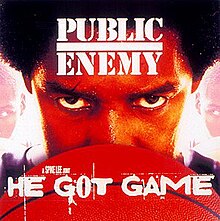He Got Game (soundtrack)
| He Got Game | ||||
|---|---|---|---|---|
 |
||||
| Soundtrack album / Studio album by Public Enemy | ||||
| Released | April 28, 1998 | |||
| Recorded | June 1997 - February 1998 | |||
| Genre | Hardcore hip hop, conscious hip hop | |||
| Length | 48:10 | |||
| Label | Def Jam | |||
| Producer | Abnes Dubose, The Bomb Squad, Danny Saber, D. R. Period, Jack Dangers | |||
| Public Enemy chronology | ||||
|
||||
| Singles from He Got Game | ||||
|
||||
| Professional ratings | |
|---|---|
| Review scores | |
| Source | Rating |
| Allmusic | |
| The Atlanta Journal-Constitution | A– |
| Chicago Sun-Times | |
| Christgau's Record Guide | A |
| Detroit Free Press | |
| Entertainment Weekly | B+ |
| Los Angeles Times | |
| Rolling Stone | |
| Spin | 8/10 |
He Got Game is a soundtrack and sixth studio album by American hip hop group Public Enemy, released on April 28, 1998 under Def Jam Recordings. It was released as the soundtrack to Spike Lee's 1998 film of the same name and was the group's last album for Def Jam.He Got Game was produced by members of the Bomb Squad, along with producers Abnes Dubose, Danny Saber, D. R. Period, and Jack Dangers.
The album sold poorly upon its release and peaked at number 26 on the Billboard 200. Its single, the title track, charted at number 16 in the United Kingdom, where the album reached number 50. He Got Game was well received by music critics, who praised its melodic sound and Chuck D's lyrics.
He Got Game served as the soundtrack to Spike Lee's 1998 basketball drama of the same name. A film score of the same name, featuring music composed by Aaron Copland, was also released on April 21.
After a four-year hiatus by the group,Professor Griff and The Bomb Squad reunited with Public Enemy for the album, which features political, sports-derived imagery by Chuck D. According to critic Armond White, He Got Game uses basketball as a metaphor for "the essence of black male aspiration. Disproving the film's suggestion of b-ball as an easy passport out of the ghetto, [Public Enemy] challenge trite assumptions about black luck and skill". The album's production features backup female vocals, church-like chorales, austere beats, strings, and funk samples. The title track overtly interpolates Buffalo Springfield's 1966 song "For What It's Worth" and its vocalist Stephen Stills. It was released as He Got Game's only single in May 1998.
...
Wikipedia
